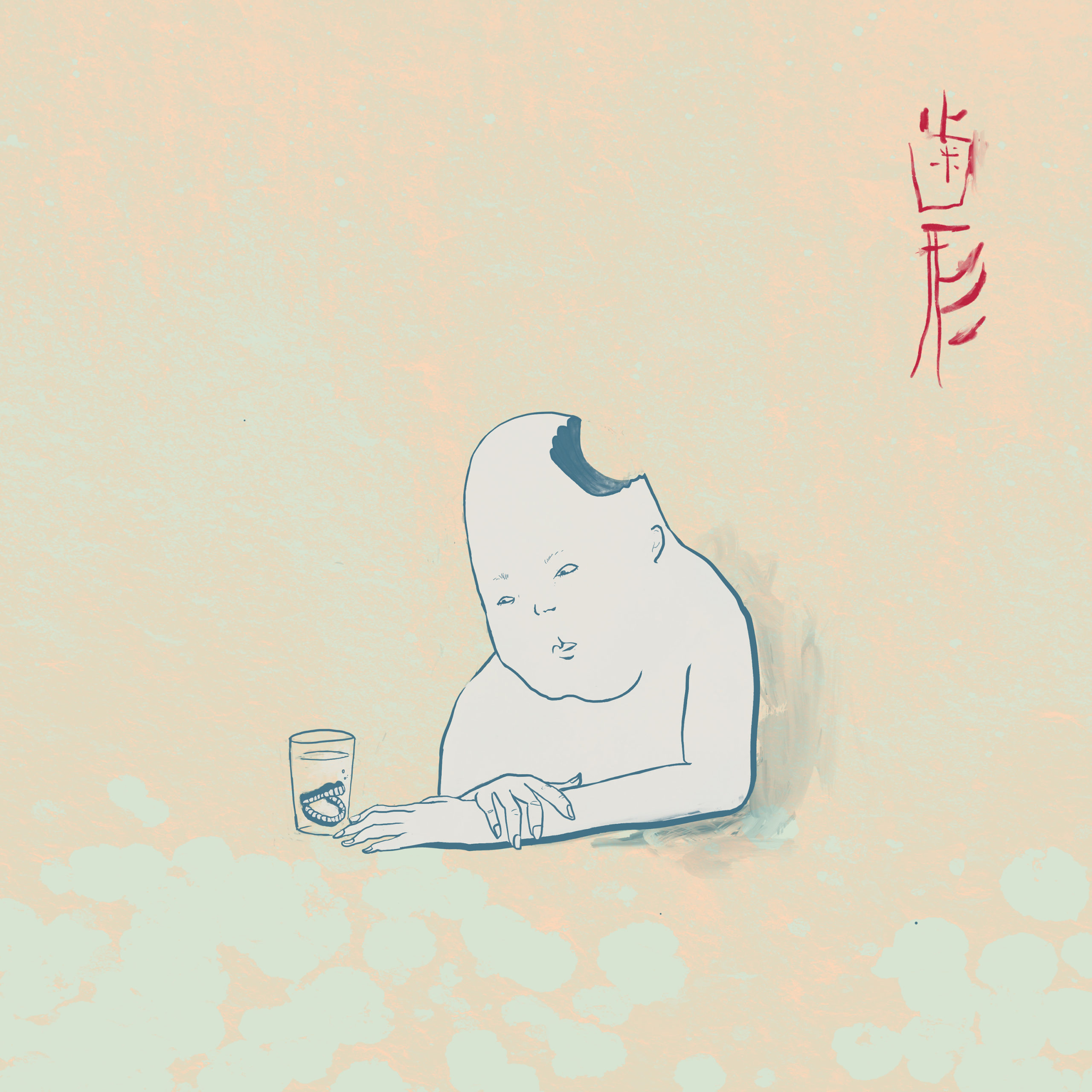
Hagata
—
Out June 09
—
Kill Rock Stars



Looking up at the sky one afternoon, Maya Kuroki spotted a cloud that looked like it had a bite taken out of it. One word immediately sprung to mind for the vocalist of TEKE::TEKE. “Hagata is a very deep word, something present but also something leftover from someone or something no longer there,” she explains. “It’s like waking up from a dream, or being connected to the other side of something.” The psychedelic rock group are very familiar with that sense of duality, of splitting reality between past and present, complex melodies and hushed interludes, intense action and lingering response. And on their new album, the fittingly named Hagata (due June 9th via Kill Rock Stars), the Montreal seven-piece explore what it means to walk multiple paths at the same time, the songs bearing the mark of the album’s title.
TEKE::TEKE’s 2021 debut album, Shirushi, was built by carefully assembling countless splinters of Japanese folk, psychedelia, Brazilian garage rock, and other far-flung touchstones. In the long months of touring that followed, the band trusted their process, indulging in and learning from stretching out in free-floating experimentation. Returning to the studio for the followup, they remembered the hagata instead of feeling a need to choose one way forward or the other. “We went two ways at once!” explains guitarist/songwriter Sei Nakuchi Pelletier. That mythic pairing seeps into every element of Hagata, from the recording sessions to the final product.
Album opener and lead single “Garakuta” leads the charge, matching muscly intensity with moments of cloudy meditation—like a world-class high jumper finding bliss at the apex of their leap. Framed by regal flute and guitar, a thumping rhythm section, and gravelly backing vocals, Kuroki delivers a reverb-drenched rallying cry, which she calls “a song of rebellion for all that has been thrown out of this world.” And as the band’s psychedelic roil comes to a climax, her Japanese dips into a mellifluous breath to paint a landscape of plastic flowers, polystyrene snow, and mountains of cellphones.
Another impactful synchronicity came after scoping out producer Daniel Schlett’s Brooklyn studio, where they learned that he also worked out of an identical space in scenic Mountain Dale, New York. The group opted for the more rural setting, breathing in the countryside and cooking with organic veggies brought by studio owner Josh Druckman. “His garden contributed to the record in a big way,” Pelletier laughs. “We wanted to explore the TEKE::TEKE world further, to enrich all the senses, and feeling that comfort made a real difference.”
Second single “Gotoku Lemon” leans into that comfortability, riding a low-slung shuffling beat and clustered guitar and horns. Always capable of shifting from a beguiling whisper to a histrionic wail at a moment’s notice (and hitting every emotional and tonal register in between), Kuroki’s masterful vocals are on full display, bending into a growly syllable here or a breathy exhalation there. And while flutist Yuki Isami and trombonist Etienne Lebel daubed unique colors onto Shirushi, Hagata amplifies that impressive skill with inventive arrangements, darting between tight harmonies and solo lines.
The third single from Hagata, “Doppelganger”, continues the band’s propensity for cinematic, imagist compositions. “I wrote the music to this one intentionally wanting to touch on a 70’s pop vibe, more specifically the records our parents listened to when we were kids, like Nakajima Miyuki,” Pelletier says. Hidetaka Yoneyama’s guitar rides atop Mishka Stein’s rubbery bass, Ian Lettre skipping across the cymbals as if the shimmer of light reflecting off the wavering metal were as important as the sound. As Kuroki began crafting lyrics about doppelgangers (or doubles), Pelletier was reminded of the Polish film The Double Life of Veronique—about two women who have never met and live in different parts of the world, and yet who seem to share some surreal bond—and the group watched the film together before finishing the song. “That’s when we decided to add some string arrangements and just go for the Serge Gainsbourg, Jean-Claude Vannier vibe,” he says. As a result, the band explores a similar intractable connection: between past and present, between Canada and Japan, of multiple identities lived at once.
From the tender-hearted “Jinzou Maria” to the rumbling and raucous “Yurei Zanmai”, the songs of Hagata bear that eerie yet somehow familiar sensation of the record’s title. They carry a sense of change, impact, of having been marked in an intimate way. And yet the force behind that marking is always just out of grasp, a wisp, a ghost, an energy, a spirit that compels you to keep reaching. And at the end of the day, the concrete answer of how that bite happened is far less thrilling than the bite itself. On Hagata, TEKE::TEKE move beyond the idea of walking across multiple paths, instead existing so fully in the space between that the usual constraints of creativity no longer apply. “We don’t need a name, body, voice, lies, truth, or shame,” Kuroki says. “Ghosts are forever free and keep dancing.”